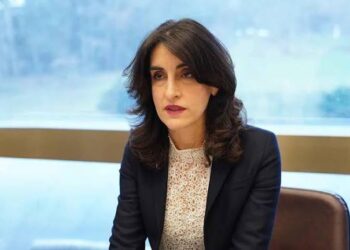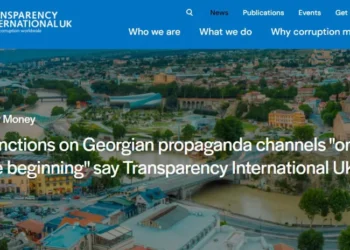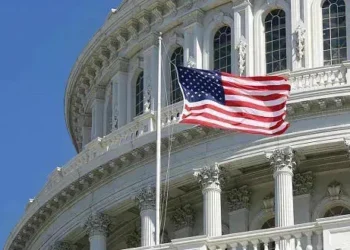Dear Russians,
“In a few hours, we will see a magical date on our calendars, the year 2000, a new century, a new millennium.
“…Today I am sending you my last New Year’s greetings. But that’s not all: this is the last time I am addressing you as President of Russia. I have taken a decision, one which I pondered long and painfully. I am resigning today, the last day of the departing century.
“…I want to ask your forgiveness for the dreams that have not come true, and for the things that seemed easy but turned out to be so excruciatingly difficult. I am asking your forgiveness for failing to justify the hopes of those who believed me when I said that we would leap from the grey, stagnating totalitarian past, into a bright, prosperous and civilized future. I believed in that dream, I believed that we would cover the distance in one leap.” On the night of December 31, 1999, with these words, Russian President
Boris Yeltsin resigned and handed over the reins of power to Prime Minister Vladimir Putin.
According to polls and surveys, Boris Yeltsin’s approval rating at the time of his resignation was only 2%. Consequently, the vast majority of Russian citizens welcomed his resignation. At the same time, there was a belief that Putin would be the leader who would usher in a bright future for Russia. By this time, Vladimir Putin had been Prime Minister of Russia for five months. Two weeks after his appointment, he had started the second war in Chechnya, which ended three weeks after his official inauguration as President.
It was the Second Chechen War that was one of the main reasons for Putin’s growing popularity, as he was able to achieve in eight months what his predecessor had failed to do for almost two years during the First War. Putin was able to accumulate major political capital during his short tenure as prime minister, although he also managed to build a certain reputation during his tenure as head of the Federal Security Service and as secretary of the Security Council.
Putin’s presidency has restored Russian citizens’ belief in a brighter future. However, how this “bright future” was supposed to look was not agreed upon by everyone. For some, it was important that the future be civilized along with being bright, which in itself meant overcoming the totalitarian past. Others did not care much about civilization and overcoming totalitarianism and only needed a bright and at the same time rich future. The young president took the path of the latter because, unlike Yeltsin, he believed that “the collapse of the Soviet Union was the greatest geopolitical catastrophe of the twentieth century.”
Vladimir Putin took over the presidency on May 7, 2000. The term “Putinism” appeared in the Russian press on the 11th. In an article published by Andrei Piontkovsky in the newspaper Sovetskaya Rossiya, “Putinism” was defined as “the highest and final stage of bandit capitalism … when democratic freedoms and human rights are denied … the nation is” consolidated “around hatred of any ethnic group … “Freedom of speech is being persecuted and the process of brainwashing the masses is underway… Russia is isolated from the outside world and the process of economic degradation continues.”
After Piontkovsky, a number of scholars became interested in the phenomenon of Putinism. This was influenced by Putin’s long, arguably endless rule, as well as its specific nature.
One of the main characteristics of Putinism is the cult of personality. According to many scholars, “Putinism” in the 21st century is as important a term as “Stalinism” was in the 20th century. The entire political elite, the state bureaucratic machine, and the Kremlin-controlled media are working to glorify Putin in order to strengthen the cult of personality. Putin is portrayed as a “national hero” who was able to “get Russia back on its feet”, which had fallen into the worst situation since the collapse of the Soviet Union, and “restore dignity” to it. Attempts to glorify him sometimes go so far as to equate the state with Putin.
Putin’s foreign policy approaches play an important role in strengthening the cult of personality. Particularly important in this regard are the Kremlin revisionism, the attempts to revise the world order agreed upon after World War II, and chauvinist nationalism. Such an attitude implies a sharp confrontation with the free world on a number of issues, as a result of which Russia often suffers, although it can easily dupe its citizens into thinking otherwise. Russia is a superpower and it is not obliged to coordinate its actions with anyone. A clear expression of revisionism and chauvinist nationalism was the 2008 Russia-Georgia war and the recognition of Georgia’s occupied territories as independent states, as well as the occupation of Crimea and the declaration of the Russian Federation.
Violation of the principle of inviolability of borders and territorial expansionism make Putin’s Russia a particularly aggressive force, which violates the rules of the game agreed upon in the civilized world. On the other hand, such a policy receives special approval among a solid part of Russian citizens and is the main inspiration of their “imperialistic” aspirations.
That is why it is not surprising that in domestic and foreign policy, Putinism is actively romanticizing the Soviet past. In the prism of Putinism, the Soviet Union was the most powerful superpower, creating a balance in the bipolar world and a worthy rival to the West, and first and foremost to the United States. In addition, people in the Soviet Union lived “happily ever after” without any concern for freedom of speech, human rights, or other democratic notions. Russia weakened under Yeltsin. He could no longer afford a decent resistance to the West, and Putin changed that picture radically. Today, Russia is an accountable force that creates a new reality and is a worthy successor to the Soviet Union in this regard. Putin is trying to at least partially fix the “greatest geopolitical catastrophe of the twentieth century.”
The cult of personality itself implies the concentration of power in the hands of one person. One of the main features of Putin’s rule is the complete usurpation of power, where the president is everything and state institutions are practically non-existent. The government of the Russian Federation is weak and powerless, and the parliament is a puppet. In 2008, Putin’s second four-year term expired. He then moved to the post of Prime Minister and continued to rule the country from there. At the same time, in order to strengthen his power, constitutional amendments were adopted which set the term for the election of the President at six years instead of four, although the restriction on being elected twice in a row remained in force. In 2012, Putin was elected for a third term, and in 2018 for a fourth term, after which the limit of two consecutive elections expired again and ahead of 2024, it became necessary to find a new solution.
Russia has begun work on a new package of constitutional amendments. Many experts suggested that Putin would no longer remain as president and would continue to run the country from another position, which he already had experience with in 2008-2012, although the process developed against expectations. Putin no longer wanted to even temporarily and formally hand over the top seat to someone else, and so developed a completely new approach. In 2024, Russian citizens will still be able to elect Putin, although this will not be the third election in a row, because his previous terms have been simply “annulled”. It turns out that by 2024, the Russians will elect Putin as if he had never been elected before. In this way, Vladimir Vladimirovich extended his power until 2036. Before that he has a lot of time to think and now everyone is sure that he will definitely find a way to maintain power.
The constant constitutional changes, the extension of deadlines, and the concentration of power in Putin’s hands, also indicate his attitude towards his government. In 1999-2008, Putin replaced three prime ministers, but did not name any formal replacements and handed over the presidency to First Vice Prime Minister Dmitry Medvedev. In 2012, he exchanged seats with Medvedev and appointed him prime minister. In early 2020, he was promoted to the position of Deputy Chief of Staff of the Security Council (Putin himself being in charge). This position did not exist before and was specially created so that Medvedev would not remain unemployed. Mikhail Mishustin was appointed Prime Minister, who has an even more nondescript name than Dmitry Medvedev.
The absolute power of one person needs a solid foothold. Putin’s rule is no exception. The mainstay of Putinism is the Silovik clan. This is not surprising, since Putin himself is a “silovik” and his spy past is no secret. It is the Siloviks who hold the reins of political and financial power. Their power is immeasurably greater than that of other elite. They control more than 20 major Russian federal agencies. They are former employees of the Federal Security Service, militia, army, National Guard and other law enforcement agencies. Putin’s coming to power is often referred to as a “Chekist coup”, which means that Boris Yeltsin did not go home voluntarily in his time.
The power of the “Siloviks” in Russia is so great that some scholars are still trying to answer the most important question in Putin’s Russia: Did Putin create a functioning system, or was Putin created by this system? There is no agreed answer to this, although the fact that reading has not lost its relevance in academic and expert circles for years is a clear indication of the scale of power of this group. According to 2004 data, the Siloviks made up 25% of Russia’s political elite. In Putin’s inner circle, which consists of about 20 people, their concentration was 58%, they represented parliament 20% and the government 34%. These numbers are growing every year. Therefore, the above question will remain relevant as long as “Putin’s Russia”, often referred to as the “Chekist state”, is alive.
The nature of the Putin regime and the high concentration of force in it naturally lead to the absolute opacity of the system. Decision-making mechanisms are vague, there is no public policy, and the state bureaucracy is in the service of clan interests instead of the people.
In addition, the clan has full control over the management of Russian state property and natural resources. Instead of a free market, the rules of the “clan corporation” apply. All the wealth of the Russian Federation is in the hands of a narrow group, which is clearly shown by the intensified anti-corruption studies in recent years.
The judiciary is also completely usurped. Selective justice has become a common occurrence in Putin’s Russia. The principle of “everything for friends, the law for enemies” is in force in the country, a clear example of which is the numerous high-profile cases of persecution of people opposed to the Putin regime.
That regime is particularly ruthless with its opponents. Putin’s Russia is considered one of the most dangerous countries in the world for journalistic activities. In the very first year of coming to power, 19 journalists were killed in Russia, and under Putin’s rule, their number is in the hundreds. One of the most notorious of these was the October 7, 2006 murder of Anna Politkovskaya. It is noteworthy that not only firearms but also various types of poison are used to kill journalists.
In addition to journalists, the regime actively fights opposition politicians. The most active critic of the Kremlin, Boris Nemtsov, was shot dead on February 27, 2015 near the Kremlin walls. Alexei Navalny is still serving his sentence on absurd charges.
Like politicians, civil activists and civil society as a whole are persecuted. Various organizations are given the status of “foreign agents” and their activities are banned. Ex-agents fleeing the country are persecuted, poisoned and killed (Litvinenko, the Skripals). The Russian media is almost completely usurped. There is censorship in the country, there is a circle of people who cannot be invited to state-run television.
The persecution of opponents is typical of all authoritarian regimes. Obviously, Putin’s Russia is no exception. Putinism does not need critics and dissent, because any criticism is out of place, any dissent is unacceptable.
As noted above, Putinism is largely fueled by Soviet nostalgia and tends toward its reincarnation. This is manifested in revisionism, territorial expansionism, clan governance, the absence of the rule of law, the persecution of opponents, etc., although there is something that distinguishes it from the USSR due to the current situation. Unlike the Soviet atheist regime, Putinism cooperates with the Russian Church. To be more precise, the criminal state is involved in a criminal deal with a criminal church. Stimulating militant atheism is not one of the goals of Putinism, it is aimed at further desecularizing society. In the process, the Russian Church significantly strengthens the cult of Putin’s personality and in return enjoys wide-ranging privileges from the regime.
In addition, the regime actively uses the policies of the Church and Orthodoxy in the foreign arena. He is trying to spread the concept of the “Orthodox world” widely in the Balkans, Ukraine, Moldova, Georgia, and within the framework of this policy, Putin is the only force fighting the future perversion from the West, the main defender of traditional Orthodox values.
Putinism originated at the beginning of Vladimir Putin’s rule, or perhaps before his rule. Over the past 21 years, a cult of personality similar to Stalinism has been firmly established, which has long alienated Russia from the civilized world. Putin’s rule and the cult of his personality restored a sense of “pride” and “dignity” to some Russian citizens, making them feel that the Kremlin was still strong and that the Soviet Union could exist in any other form. Putin’s government has had some economic success at some point, which has reinforced that sentiment. Yet, after 21 years in power, which is projected to last at least another 15 years, the average Russian citizen has achieved little. The illusion of the Soviet Union was aroused only in the feelings of some, because Putin’s Russia cannot bring to the citizens even the quality of social guarantees and prosperity they had in the Soviet period. The Russians accepted Soviet-like rule, a violent state, clans, usurpations of power, censorship, lack of human rights, but failed to get what they had in the USSR in the face of it all – the minimum standard of welfare.
“Pride” and “dignity” were regained by the Russian state, as well as by the Russian citizen. Russia was able to occupy the territories of neighboring countries, recognize some as independent states, declare some as their own, establish effective control over some, but in return received sanctions, economic downturns, subsidized regions, and more financial costs.
Putinism has brought the corpses of journalists, civil activists, politicians and ordinary citizens both in Russia and abroad; brought the image of Russia as an unreliable, uncivilized state.
Putinism has ultimately done nothing good for the Russian citizen unless we consider it a good thing to create certain illusions, or to enrich members of a clan who are the same Russian citizens.
Although Putinism has only brought problems, today it is the only choice for Russians. The inevitability of Putin and Putinism as the only choice of Russian citizens is clearly seen in the assessment of State Duma Speaker Vyacheslav Volodin: “Today, when we look at the challenges and threats facing the world, oil and gas are not our priority. As we have seen, the prices of both of them, oil and gas, can fall. Our advantage is Mr. Putin, and we owe it to him to defend him.” And Putin himself will probably never be heard saying the following: “Dear Russian citizens, I am for the last time addressing you today as President of Russia.”
Op-Ed by David Bragvadze, Georgian Institute for Security Policy














